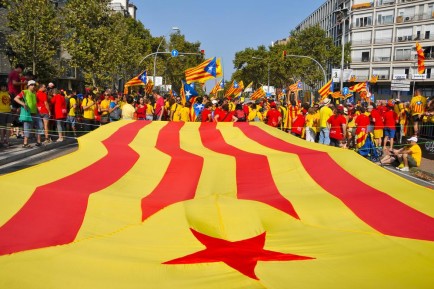
Catalans are less certain about independence since Spain’s economy has improved, but they would still like the vote.
Catalonia’s regional government has long agitated for independence from Spain, and is set to play the role of thorn in the side of Madrid once more in calling for a referendum later this year.
Led by spokesman Carles Puigdemont, the Catalan government will oversee an In or Out vote that, while likely to garner huge interest and a big turnout, will not have any legal standing within Spain…
In other words, if Prime Minister Mariano Rajoy’s Madrid government does not sanction the referendum – which it won’t – then the votes cast will be nothing more than symbolic.
It is to the surprise of nobody that the Catalan separatists are continuing to push for independence, and even a non-binding referendum such as that planned for later this year is nothing new – a similar vote was held in 2014. Back then, the will of the Catalan people to break away from Spain fell on deaf ears in Madrid, and in all likelihood it will be a case of history repeating itself in 2017.
The difference this time around, however, is that the referendum is being organised by the Catalan government itself rather than passionate volunteers (as was the case in 2014). Hence, it is expected that more than two million people will come out and vote, and while the result will still be symbolic, a heavily pro-independence leaning will heap more pressure on Madrid to at least countenance the fact that a large proportion of the Spanish population wants change.
That change is highly unlikely to ever be the granting of independence, but there could be more regional elections in Catalonia in the future, based on delivering policies that give the region more autonomy.
Madrid has the power to intervene directly in the running of Catalonia’s government – something that has long riled politicians and proud Catalans in the region, which has its own language and, in Barcelona, a ready-made, internationally respected capital city.
However, since Spain’s economy has returned to growth and economic health over the past two years, pro-independence feelings in Catalonia have weakened somewhat.
The last official poll showed that 48.5% of Catalans would like to maintain the status quo, with only 44.3% in favour of splitting from Spain. Three years ago, those tables were turned. Be careful what you wish for.
 en
en



 Vlaams-Nederlands
Vlaams-Nederlands
0 Comments
Leave a Comment
DISCLAIMER
The opinions and comments expressed by contributors to this Blog are theirs alone and do not necessarily reflect the views of VIVA Homes Under the Sun Ltd, any of its associated companies, or employees; nor is VIVA to be held responsible or accountable for the accuracy of any of the information supplied.
Have you got something to say?